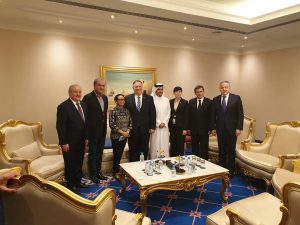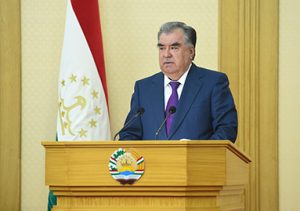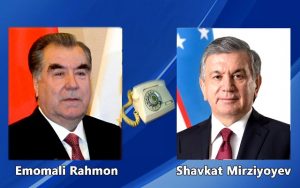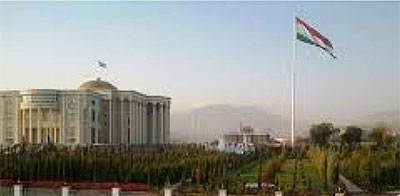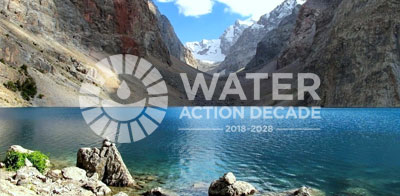The position of the Republic of Tajikistan on priority issues of the Agenda of the 73rd session of the UNG
1. The United Nations as the most universal and reputable international organization remains the main multilateral platform for achieving consensus on key issues ranging from security to development. Tajikistan is convinced that the United Nations will continue to enhance the positive dynamics in the implementation of the 2030 Agenda and its sustainable development goals, Addis Ababa Action Agenda of the Third International Conference on Financing for Development (AAAA), Paris Agreement and other basic decisions of the UNGA 73rd session. The UN Charter norms and principles retain their fundamental significance in the international relations.
2. We welcome the efforts aimed at comprehensive reform of the UN that will lead to strengthening and raising of its capacity to timely and adequately respond to the development and to efficiently address contemporary challenges and threats. The principles for the UN reform should be in harmony with the principles and goals of the UN Charter.
We support the constructive discussions, within the framework of the Ad Hoc Working Group on the revitalization of the work of the UN General Assembly (AHWG), aimed at further ways to enhance the role, authority, effectiveness and efficiency of the General Assembly.
We also support the useful consultations on enhancing the synergies and coherence and reducing overlap where it is found to exist in the agendas of the General Assembly and, the Economic and Social Council, and their subsidiary bodies, as well as the High-Level Political Forum, and other related forums in light of adoption of the 2030 Agenda for Sustainable Development.
The reform of the Security Council (SC) is an integral part of the comprehensive reform of the UN. We call for equitable representation in the Security Council and enlargement of its membership in both categories. We are interested in a broad and equitable consideration of interests of developing countries during the SC reform.
3. The UN plays central role in the organization of a timely and coordinated response to conflicts around the world. The success of actions in prevention and settlement of conflicts depends on efficient use of tools of preventive diplomacy and mediation, concerted search for diplomatic and peaceful ways of resolving crises and disputes, broadening of interaction and partnership with regional and subregional organizations.
Measures on post-conflict rehabilitation should include an efficient interaction with the host governments, reinforcement of national potential and government institutions, the introduction of effective mechanisms of mobilization and coordination of external resources, real assistance in rehabilitating the foundation and infrastructures for development and addressing economic and social issues.
The UN peacemaking activities, including peacekeeping operations and special political missions, are vital tools for maintenance of international peace and security, settlement of conflicts, and post-conflict rehabilitation. Taking into account the ever-increasing needs for peacemaking activities, we are ready to further enhance the participation of Tajikistan’s police officers in the UN peacekeeping operations.
4. Strengthening of multilateral mechanisms of control over weapons, disarmament and non-proliferation is key to maintaining global security and stability. Establishment of nuclear-free zones is an important component of nuclear disarmament and non- proliferation, expanding of cooperation on peaceful use of nuclear energy, and strengthening of regional and international peace and security. We attach special importance to the acceleration of ratification of the Protocol to the Central Asian Nuclear-Weapon-Free-Zone Treaty signed on May 6, 2014, at the margins of the 3-d NPT PrepCom Conference. We call for speedy enforcement of the Comprehensive Nuclear-Test-Ban Treaty (CTBT).
5. We attach much importance to the efficient implementation of the Convention on the prohibition of the use, stockpiling, production and transfer of anti-personal mines and on their destruction (the Ottawa Convention). We actively call for Central Asia free from mines threat and strengthening of cooperation in the field of humanitarian demining.
6. The response to the ever-increasing threat of terrorism and violent extremism, the global challenge of today, should be comprehensive, with the UN as a key coordinator. The UN global counter-terrorism strategy, the UNGA and UNSC resolutions, and the UN counterterrorism conventions form the backbone of the joint fight against terrorism. In this regard, we believe that the newly established Office of Counter-Terrorism by the UN Secretary-General will contribute effectively to the integrated and balanced implementation of the UN Global counter-terrorism strategy. The efforts should be focused on the elimination of military infrastructure of international terrorism, depriving them of the political, military and financial support; prevention of the use of the internet for countering radicalization of minds, recruitment and propaganda of extremism and violence. To discuss abovementioned issues, the Government of the Republic of Tajikistan in close collaboration with the United Nations, the Organization for Security and Cooperation in Europe, the European Union and a number of other partner countries convened the High-Level International Conference “Countering Terrorism and Preventing Violent Extremism”, on 3-4 May 2018 in Dushanbe, the outcomes of which were distributed among the UN member states as the document of the seventy-second session of the United Nations General Assembly (A/72/864 from 17 May 2018).
We are confident that the Dushanbe Conference served as an important platform for constructive and fruitful cooperation, inter alia, contributed to the achievement of a general recognition of the negative impact and consequences of the current challenges; exploring possibilities for strengthening partnership and cooperation at all levels and exchanging experiences in countering terrorism and preventing violent extremism.
We believe that regional organizations will play an important role in combating terrorism and extremism. Therefore, we call for expanding the cooperation between the UN CTC and regional organizations, including OSCE, SCO, CSTO and CIS.
7. Stable peace in the Middle East can be achieved only through a decision based on the peaceful coexistence of two independent states, Palestine and Israel. We support the willingness of Palestine to take its place in the national community as a full-fledged member. We stand for a speedy resumption of dialogues between the State of Palestine and Israel. We call on all parties to refrain from any actions which go against the maintaining peace and security in the region and fully cooperate to find a constructive and fair solution to the issue of Palestine and Israel based on international law.
8. We support the efforts of Afghanistan and its people aimed at strengthening of the national dialogue and reconciliation, and post-conflict economic rehabilitation. We call for expanding targeted assistance to Afghanistan aimed at economic rehabilitation, strengthening of the social sphere and creation of new jobs in the country. Peace and stability and urgent socio-economic rehabilitation are crucial for the development and prosperity of Afghanistan.
Involvement of Afghanistan into the process of multifaceted regional cooperation is key for the success of the efforts undertaken by the international community. We believe that one of the important directions in this regard is the creation of a favourable environment for the wide use of transit potential of Central Asian countries and Afghanistan, as well as the establishment of necessary infrastructures for free movement of goods and services in the region. We are willing to take part in the rehabilitation of the social and economic infrastructure of Afghanistan through connecting the transport arteries of our two countries, creating an “energy bridge” CASA-1000, providing the Afghan population with essential commodities and training specialists.
Tajikistan as a country sharing the longest state border with Afghanistan is also deeply concerned regarding the escalation of terrorist groups’ activities, their movement to the nothern part of country against the backdrop of the involvement of some residents of Central Asian countries to terrorist groups and movements.
9. The proliferation of illicit drug trafficking that has turned into a breeding ground for terrorism and organized crime requires joint and coordinated actions on the regional and international levels, within the framework of the three UN conventions on narcotic drugs. In this regard, Tajikistan believes that an integral part of the common fight against terrorism and organized crime is the prevention of illicit drug trafficking.
Tajikistan as a party to the Single Convention on Narcotic Drugs (1961), the Convention on Psychotropic Substances (1971) and the Convention against Illicit Trafficking Narcotic Drugs and Psychotropic Substances (1988) calls upon all the parties to the above-mentioned conventions to strongly adhere to their commitments and obligations.
Tajikistan supports the new initiative of the Government of Afghanistan to adopt “The Counter Narcotics Regional Strategy” and the UNODC initiative on “Strategic Actions to Respond to the Global Threats of Opiates (SARTO)”.
10. The UN Human Rights Council (UN HRC) is a central forum for facilitating dialogue and cooperation in the field of promotion and protection of human rights. Our view is that the UN HRC should promote universal respect for and protection of human rights and fundamental freedoms for all, without any distinction, on a just and equitable basis. We believe that in its decision-making the UN HRC should be guided by the principles of universality, impartiality, objectivity, non-selectivity, and constructive dialogue, with the aim to promote and protect human rights the world over.
The main priorities pursued by Tajikistan are strengthening of international mechanisms of human rights protection, bona fide enforcement of the commitments undertaken in this area, expanding the multilateral cooperation in the field of promotion and protection of human rights, including the rights of the persons with disabilities. Tajikistan is committed to promote and protect the rights of a vulnerable group of the population. Therefore, on 22 March 2018 Tajikistan signed the United Nations Convention on the Rights of Persons with Disabilities. We support the continuation of a constructive dialogue within the Universal Periodic Review.
11. We note the central role of the UN in combating human trafficking, which turned into one of the worst forms of violation of human rights and freedoms. More attention should be paid to the strategies aimed at the protection and rehabilitation of victims of human trafficking. Setting up regional and international mechanisms of cooperation to combat human trafficking is an important component in the struggle against this evil. We participate in the work of the Group of Friends United against human trafficking. We believe that the United Nations Global Plan of Action to Combat Trafficking in Persons promotes comprehensive, coordinated at the national, regional and international levels to counter trafficking in persons, and in this regard we emphasize the important role of the United Nations Office on Drugs and Crime in the implementation of the Global Plan of Action, including as coordinator of the Inter-Agency Coordination Group against Trafficking in Persons.
12. The UN Commission on the Status of Women is the main intergovernmental forum for the promotion of gender equality, empowerment of women and increasing their participation in all spheres of life. It is essential that the Commission aims its efforts at the search for ways of active and creative involvement of women in the process of achieving sustainable development goals and eliminating all forms of violence against women.
13. The scale and level of ambition of the 2030 Agenda require the strengthening the means of implementation, in particular for developing countries through creating the enabling global environment for development, mobilization of additional financial resources, reduction of the burden of external debts, transfer of environmentally sound technologies, reinforcement of national capacity. Sustainable financing options, long-term investments and global partnerships is needed for the achievement of the 2030 Agenda. In this regard, commitments undertaken in implementation of the decisions of the Third International Conference on Financing for Development (Addis Ababa, July 13-16, 2015) should be fulfilled.
14. The Economic and Social Council (ECOSOC) is the central intergovernmental body of the United Nations to advance the three dimensions of sustainable development — social, economic and environmental. As a member of ECOSOC for 2017-2018 and its Bureau we have been actively participating in all it’s meetings as well as successfully organized the Integration Segment of ECOSOC on 1-3 May 2018. During that period Tajikistan was a member of the following ECOSOC subsidiary bodies: Commission on Narcotic Drugs and Commission on the Status of Women. We hope the ECOSOC will continue fostering innovative thinking, forging consensus, and coordinating efforts of the member states and other stakeholders to achieve international agreed goals.
15. Lack of access to sea and isolation from world markets complicates integration of land locked developing countries (LLDC) into the system of multilateral trade and has negative impact on other aspects of sustainable development. We call for the provision of a regime of preferential treatment in a trade to the LLDCs. We also call for the elimination of all artificial and economically unsubstantiated barriers and obstacles in transport and communications that do not contribute to the development and strengthening of cooperation and partnership.
The implementation of the Vienna Programme of Action for LLDCs is a necessary requirement for integration of the LLDCs into the global economy and achievement of the 2030 Agenda, in this regard.
16. Access to modern and cost-efficient energy services is key to achieving sustainable development. We believe it is essential to intensify the efforts of the UNGA and ECOSOC, and “UN-Energy” at providing wide access to energy. Tajikistan actively supports the initiative of the UN Secretary-General “Sustainable energy for all” and the International Decade of sustainable energy for all, 2014-2024.
17. Climate change is a serious and complex challenge that undermines the efforts of the international community in achieving sustainable development and brings about natural disasters. The response to this challenge should be coordinated and should be based on short- and long-term measures. It is essential to strengthen, under the UN coordination, the existing financial mechanisms and cooperation on creation of effective methods for technology transfer and the promotion of the developing countries’ capacity for adaptation to climate change, as well as risks reduction and mitigation of consequences of natural disasters, caused by it.
We attach particular importance to the Sendai Framework for Disaster Risk Reduction 2015-2030, which is called upon to promote the improvement of systems of early warning, to increase investments in programs on natural disasters risk reduction and to render financial assistance to developing countries.
We also attach much meaning to speeding up the process of ratification and enforcement of the Paris Agreement on climate change. Tajikistan introduced a system of regular (once in 2 years) accounting and reporting of greenhouse gases.
18. Tajikistan as a country with significant water resources cannot be indifferent to water-related issues. We attach great importance to the promotion of the global water agenda. That is why, we proposed the resolution proclaiming period of 2018-2028 years as an “International Decade for Action ‘Water for Sustainable Development’, 2018-2028”, adopted with consensus by UN General Assembly on 21 December 2016 (A/RES/71/222).
The above Water Action Decade was launched on 22 March 2018 coinciding with the International Water Day in UN Headquarters within the special event, attended by President of the Republic of Tajikistan H.E. Mr. Emomali Rahmon, Secretary-General of the United Nations H.E. Mr. Antonio Guterres, Vice-Presidents of the 72nd session of the UN General Assembly and other international experts and Permanent Representatives to the United Nations.
In accordance with A/RES/71/222 the objectives of the Decade will be mainly focused on sustainable development and integrated management of water resources for the achievement of social, economic and environmental goals; implementation and promotion of related programmes and projects; furtherance of cooperation and partnership at all levels in order to help to achieve internationally agreed water-related goals and targets, including those contained in the 2030 Agenda for Sustainable Development. It will become a solid platform and promote the coordination and promotion of all efforts to address the issues and problems related to water resources. Also, the Water Action Decade is aimed to continue implementation of the indicated steps of the International Decade for Action «Water for Life, 2005-2015», enriching it with new measures and efforts to achieve Sustainable Development Goals.
To discuss the ways in which Member States, the United Nations, other international and regional organizations, international financial institutions, the private sector, as well as civil society and other stakeholders, can contribute to implementation of the Decade Tajikistan and the United Nations convened the High-Level International Conference on the “International Decade for Action ‘Water for Sustainable Development’, 2018-2028” on 20-22 June 2018 in Dushanbe.
Several high-level representatives expressed support and keen interest in the transformation of the Dushanbe Conferences into the “Dushanbe Process” for the Water Action Decade and in the creation of an International Center for the Water Action Decade in Dushanbe, aimed at supporting the implementation of the Decade, including the organization of the biennial Water Decade Conferences.
The conference was a clear success, largely thanks to the joint and coordinated efforts of all parties. The outcomes of the Dushanbe Water Decade Conference were disseminated among the UN membership as the document of the seventy-third session of the United Nations General Assembly (A/73/166 from 16 July 2018).
In this regard, Tajikistan urges all Member States to actively participate in the preparation process of a United Nations General Assembly resolution on the Mid-Term Comprehensive Review of the International Decade for Action “Water for Sustainable Development”, 2018-2028, to be undertaken during the 73th session of the United Nations General Assembly.






